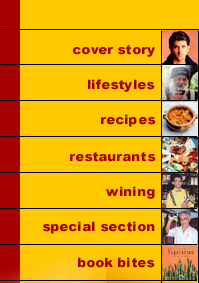


 �Dum Pukht Comes From India Not Pakistan'
�Dum Pukht Comes From India Not Pakistan'
Chef Imtiaz Qureshi, Pioneer of Dum Pukht |
|
CHEF Imtiaz Qureshi of dum pukht cooking fame, is a large jolly man with a twirling moustache, silver hair, and light grey twinkling eyes. Without his apron and chef�s toque, you could confuse him with Santa Claus. He�s got that air about him.
Chef Qureshi is the stuff that legends are made of, he is the grand old man of Indian khaas khana, a master chef who is credited with reviving the centuries-old Lucknowi tradition of dum pukht cooking in India.
What is dum pukht? He explains it carefully. �Dum means steam, and dum pukht is the maturing of food on slow coal fires in its own steam. The food is cooked in its own juices in copper handis that are sealed with a ring of dough, and which are given heat from top and bottom. Since vapour cannot escape, the food retains its flavours and aromas and is particularly tender and tasty.
He brought back this school of cooking and introduced it to India through the Welcomgroup�s Dum Pukht chain of restaurants in the country. Newsweek put him on the cover in the mid-Nineties and with that, the world became aware of Imtiaz Qureshi and his unique style of cooking.
Food impresario Jiggs Kalra wrote about Imtiaz Qureshi in his book Prashad, �What sets him apart from the rest is his willingness to take culinary risks. He is almost compulsive about combining ingredients that others, more timid, might consider mutually exclusive. While he does not deviate from the classic form, his culinary philosophy is the more you innovate, the tastier will be the delicacy. His pioneering effort in reviving dum pukht cooking is his unique contribution to Indian cooking.�
True. But Imtiaz Qureshi, who is a man of few words, has his own explanation for his amazing food. �The secret of a successful dish,� he says, �is that it must be prepared with love and respect... for the food and for the guest. Dil se, dimag se aur mehnet se.
Dum pukht food was always in India, he says, but like the North-West Frontier Province cuisine, it was also being credited to Pakistan. �That�s wrong. People must remember that Pakistan was part of India till fifty years ago, and Mughlai food existed in the country in Lucknow, Hyderabad and Kashmir long before partition,� he says.
To get the full meaning and taste of dum pukht cooking, he insists on eating a meal cooked by him course by course, preferably changing the plates in between each course. �This one-meal khana system in India is all bakwas,� he grumbles, �with the gravies getting mixed with each other and the dal running into the meat and making the rice and kebabs soggy!�
He now wants to write a book on dum pukht cooking that will be accepted not just by the foodies and gourmets of the country, but also by catering colleges, by the chefs of five-star hotels, by housewives, by everyone. He admits to being unschooled and is unable to read and write. Which is why he has no written recipes of his treasure house of dum pukht recipes.
They are all in his head. And he makes them out of sheer judgement. Imtiaz Qureshi is not a measures and ounces man, the ingredients of his recipes are measured out in his big, fleshy palm. In these circumstances, he knows writing a book will be difficult, but he will get his sons to help him, he says.
Imtiaz Qureshi�s sons are all young master chefs themselves who specialise in Lucknowi Awadh cuisine and dum pukht cooking. They don�t have formal catering college backgrounds and they don�t believe in such training and degrees. Not with the Shahenshah of Mughlai cooking at home. Imtiaz Qureshi has trained them all in his fine art and set them up in established hotels all around the country. But he has not stopped learning himself.
By Allah�s grace, I am always meeting people with a taste for food and a story to tell. I soak information like a computer. Once I do that, once I get a new recipe in my hand, I turn it around. Recipes are like languages, each one is different, but not so difficult that you cannot adopt it to suit your tongue. Then learn it and master it.
|

Home Page
About the mag
Subscribe
Advertise
Contact Us